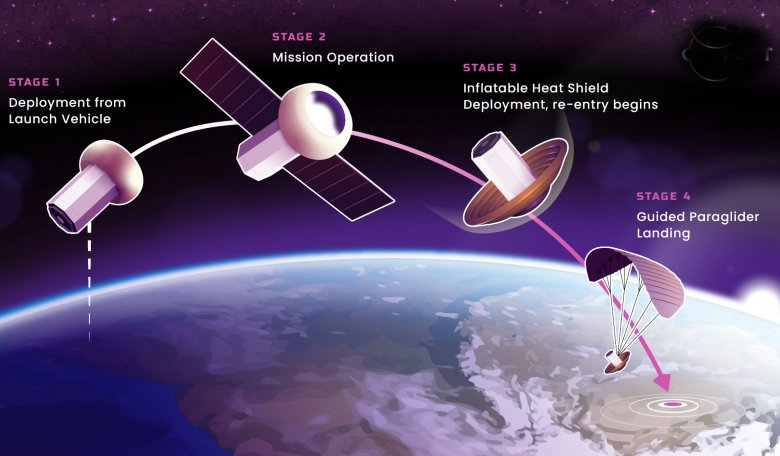Outpost Technologies Corporation (Outpost), the first space company to develop a platform for returning satellites to Earth, has been selected by NASA for further development work on a Cargo Ferry for servicing spacecraft in low Earth orbit (LEO).
The Phase 1 SBIR Ignite Contract with NASA is for an adaptation of the firm’s Earth returning Ferry satellite, designed to deliver cargo from space stations back to Earth. Outpost was the only awardee for the subtopic focused on rapid, reliable, and cost-effective re-entry capabilities.
The development of Outpost's Ferry and Cargo Ferry also utilises a NASA partnership through a Reimbursable Space Act Agreement (SAA), which enables collaboration on developing NASA's Hypersonic Inflatable Aerodynamic Decelerator (HIAD) to provide industry-leading payload Earth return capabilities from orbit.
Applications of the Cargo Ferry include Earth return of non-human cargo, scientific samples, small payloads, and important research. For the Cargo Ferry project Outpost is teaming with Nanoracks and Spaceflight in an effort to bring the technology to mission ready as quickly as possible.
"The Outpost Ferry makes prioritised Earth return of payloads possible, and with our large payload mass fraction does it for very low cost," says CEO Jason Dunn. "Driving down the cost of Earth return could open the door to more throughput on the International Space Station (ISS) while also enabling the broader low Earth orbit economy to flourish."
The Space Station has limitations on stowage capacity, requiring tough decisions by the ISS programme office each time a new payload is manifested. By returning stowed cargo to Earth, more room is made for new science and R&D in orbit.
“Dedicated payload and cargo return is one of the few remaining items left unsolved for commercial LEO destinations (CLDs) business models to close. Companies and institutions looking to iterate quickly in the space environment need fast Earth return,” added Dunn. “As we develop the Cargo Ferry our sights are set on a future human rated version that may one day provide a solution for emergency evacuations from commercial space stations.”
The Cargo Ferry will be smaller than fixed heat shield systems and be more suitable to CLDs which are expected to be smaller than the ISS. It will, however, be scalable to heavier cargo with less of a direct increase in mass and volume than a fixed heat shield, as the heat shield is collapsed for all mission phases until the very final entry.
"We’re spearheading a new way of doing space industry that’s reusable, not disposable,” said Dunn, who founded Outpost in 2020 along with industry veterans Michael Vergalla, and Aaron Kemmer. “There needs to be a fundamental mind shift to how space is done from planned obsolescence to responsible space use, and it is critical to not continue and add to this problem.”
Intro image: Concept graphic for Outpost small satellite return to Earth system.
Outpost to develop ISS cargo ferry under NASA contract











